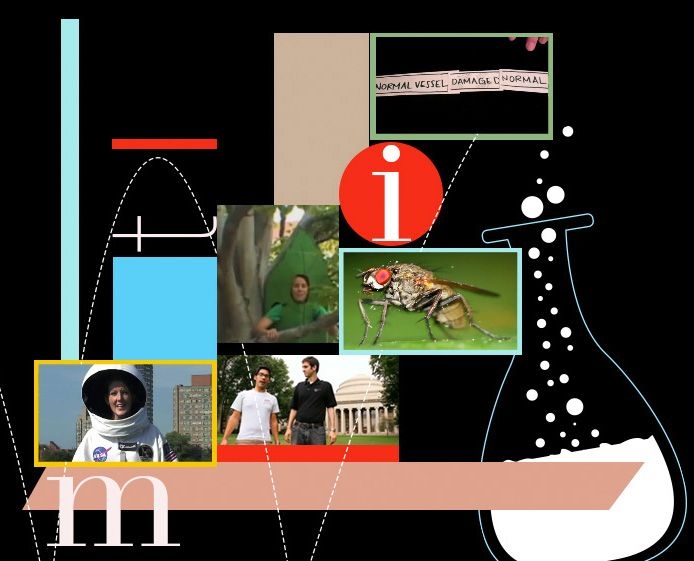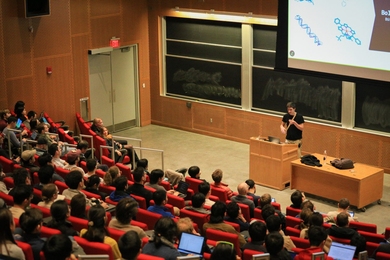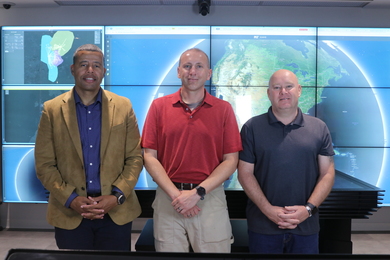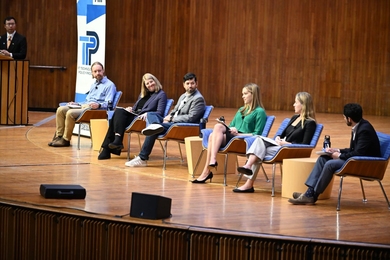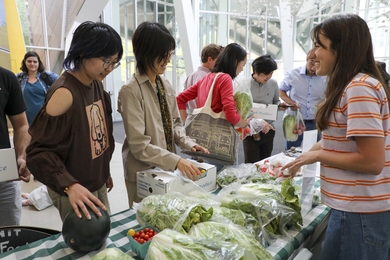MIT has launched an initiative encouraging its students to produce short videos teaching basic concepts in science and engineering. The videos — aimed at younger students, in grades from kindergarten through high school — will be accessible through a dedicated MIT website and YouTube channel. A subset of the videos will also be available on Khan Academy, a popular not-for-profit educational site founded by an MIT alumnus.
“We wanted to help inspire young people to change the world through engineering and science, and realized that the 10,000 superstar students we have at MIT are uniquely positioned to do that,” says Ian A. Waitz, dean of the School of Engineering and the Jerome C. Hunsaker Professor of Aeronautics and Astronautics. “Our students have responded with all the energy and enthusiasm we knew they would. We worked with them to design the program, and the results are fantastic.”
Waitz conceived of the initiative — known as MIT+K12 — to help address growing challenges in primary and secondary education in the United States, especially in the areas of science, technology, engineering and math. A 2010 survey of American teenagers showed that only 5 percent view engineers as significant contributors to society. Moreover, the National Academy of Engineering reports that less than 5 percent of all university degrees awarded in the United States are in engineering, compared to 21 percent in Asia and 12 percent in Europe.
Under MIT+K12, MIT students produce videos that are five to 10 minutes long on topics of their choosing; they can also develop video concepts requested by teachers, K-12 students and other users. In the three dozen MIT+K12 videos posted so far, students have focused on topics ranging from flying robots to basic chemistry to Earth’s rotation.
MIT+K12 also offers opportunities for K-12 students and teachers to communicate with the MIT students making the videos, and vice versa. “From the outset, MIT students wanted to know their videos would be useful to the students watching them,” Waitz says. “The only way to really figure this out is to put the groups in touch with each other.”
MIT is also working to make contact with students and teachers directly — such as through a traveling exhibit to be displayed April 27-29 at the USA Science and Engineering Festival in Washington, D.C.
The videos appear to be striking a chord with younger students: In a survey of 300 K-12 students who viewed some of the initial MIT+K12 videos, 73 percent indicated that the videos “showed me that science and engineering could be cool.” Sixty-two percent believed the videos added value to their classroom lessons on a given topic.
The MIT+K12 project has been developed in collaboration with Khan Academy founder Salman Khan ’98, MEng ’98, who will be MIT’s Commencement speaker on June 8. During a visit to campus last November, Khan gave a special tutorial to MIT students and shared his experience on delivering online educational content via short-form video. “To a large degree, we don’t know what is exactly the right formula [for educational video],” Khan told the students, “and for all we know there isn’t just one.”
MIT’s collaboration with Khan Academy has continued since Khan’s visit, leading to an agreement through which MIT+K12 video content will be integrated with Khan Academy’s existing offerings. Khan Academy, launched six years ago, offers an online library of some 3,100 videos that have already received more than 140 million views.
After receiving approval for a video on a given topic, MIT students can qualify for financial support, the use of equipment, some training and professional editing services. So far, MIT students have generated approximately 75 videos for MIT+K12, half of which have already been made public through the program’s YouTube channel.
Ultimately, Waitz hopes MIT students will make hundreds of videos, on a wide range of topics, for students at every level. There are also plans to use these videos in support of the Institute’s online college-level learning initiative, MITx.
“We wanted to help inspire young people to change the world through engineering and science, and realized that the 10,000 superstar students we have at MIT are uniquely positioned to do that,” says Ian A. Waitz, dean of the School of Engineering and the Jerome C. Hunsaker Professor of Aeronautics and Astronautics. “Our students have responded with all the energy and enthusiasm we knew they would. We worked with them to design the program, and the results are fantastic.”
Under MIT+K12, MIT students produce videos that are five to 10 minutes long on topics of their choosing; they can also develop video concepts requested by teachers, K-12 students and other users. In the three dozen MIT+K12 videos posted so far, students have focused on topics ranging from flying robots to basic chemistry to Earth’s rotation.
MIT+K12 also offers opportunities for K-12 students and teachers to communicate with the MIT students making the videos, and vice versa. “From the outset, MIT students wanted to know their videos would be useful to the students watching them,” Waitz says. “The only way to really figure this out is to put the groups in touch with each other.”
MIT is also working to make contact with students and teachers directly — such as through a traveling exhibit to be displayed April 27-29 at the USA Science and Engineering Festival in Washington, D.C.
The videos appear to be striking a chord with younger students: In a survey of 300 K-12 students who viewed some of the initial MIT+K12 videos, 73 percent indicated that the videos “showed me that science and engineering could be cool.” Sixty-two percent believed the videos added value to their classroom lessons on a given topic.
The MIT+K12 project has been developed in collaboration with Khan Academy founder Salman Khan ’98, MEng ’98, who will be MIT’s Commencement speaker on June 8. During a visit to campus last November, Khan gave a special tutorial to MIT students and shared his experience on delivering online educational content via short-form video. “To a large degree, we don’t know what is exactly the right formula [for educational video],” Khan told the students, “and for all we know there isn’t just one.”
MIT’s collaboration with Khan Academy has continued since Khan’s visit, leading to an agreement through which MIT+K12 video content will be integrated with Khan Academy’s existing offerings. Khan Academy, launched six years ago, offers an online library of some 3,100 videos that have already received more than 140 million views.
After receiving approval for a video on a given topic, MIT students can qualify for financial support, the use of equipment, some training and professional editing services. So far, MIT students have generated approximately 75 videos for MIT+K12, half of which have already been made public through the program’s YouTube channel.
Ultimately, Waitz hopes MIT students will make hundreds of videos, on a wide range of topics, for students at every level. There are also plans to use these videos in support of the Institute’s online college-level learning initiative, MITx.
